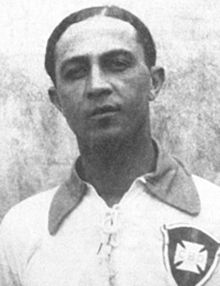Arthur Friedenreich

Friedenreich with the Brazilian national team .
|
|||
| Personal information | |||
|---|---|---|---|
| Date of birth | July 18, 1892 | ||
| Place of birth | São Paulo, Brazil | ||
| Date of death | September 6, 1969 (aged 77) | ||
| Place of death | São Paulo, Brazil | ||
| Height | 1.70 m (5 ft 7 in) | ||
| Playing position | Striker | ||
| Senior career* | |||
| Years | Team | Apps | (Gls) |
| 1909 | Germânia | ||
| 1910 | Ypiranga | ||
| 1911 | SC Germania | ||
| 1912 | Mackenzie College | ||
| 1913–1915 | Ypiranga | ||
| 1916 | Paulistano | ||
| 1917 | Ypiranga | ||
| 1918–1929 | Paulistano | ||
| 1930–1933 | São Paulo | ||
| 1933 | Atlético Mineiro | ||
| 1933–1935 | São Paulo | ||
| 1935 | Flamengo | ||
| Total | unknown | (1329) | |
| National team | |||
| 1914–1925 | Brazil | 23 | (10) |
| * Senior club appearances and goals counted for the domestic league only. |
|||
Arthur Friedenreich (July 18, 1892 – September 6, 1969) was a Brazilian football player. Nicknamed The Tiger, he was arguably the sport's first outstanding black player. He is occasionally stated as the all-time top scorer in professional football, with 1329 goals, although this is highly disputable.
Friedenreich was born in São Paulo to Oscar Friedenreich, a German businessman whose father immigrated to Brazil, and Mathilde, an African Brazilian washerwoman and the daughter of freed slaves. Friedenreich was the first professional football player of Afro-Brazilian origin, because at that time football was dominated by Whites and Blacks were not accepted. He faced many barriers because of racism, and he could not attend the same places where white players were, such as swimming pools, tennis courts and parties.
He started his career influenced by his father, playing for SC Germânia, a Brazilian football team composed of German immigrants. After playing with a succession of São Paulo club sides from 1910 onwards, Friedenreich made his debut with the national team in 1914. He played twenty-two internationals, including wins in the 1919 and 1922 editions of the Copa América, scoring ten goals. On Brazil's 1925 tour of Europe, he was feted as the King of Football.
He was not picked by Brazil for the 1930 FIFA World Cup because there was a serious misunderstanding between the football Leagues of the States of Rio de Janeiro and São Paulo; only players from Rio travelled. São Paulo stars, like him (who was 38 years old), Filó (who would be 1934 FIFA World Cup champion with Italy) and Feitiço, did not go to Uruguay.
...
Wikipedia
